A trust is a legal arrangement that lays out how property and assets contributed to the trust are managed during your lifetime and at your passing. Charitable trusts include provisions for the trust creator to use their assets to support charitable causes they find meaningful. They can be effective tools to satisfy philanthropic goals and estate planning at the same time.
Two types of commonly used Charitable Trusts:
- Charitable Remainder Trust
- Charitable Lead Trust
Charitable Remainder Trust – designed to give assets to charity and receive income in the during the creator’s lifetime. During the term of the trust, the trust pays out either a fixed dollar amount or a percentage of the trust assets each year to the trust to the trust creator. One or more qualified charitable organizations are named in the trust to receive the remaining assets at the end of the trust term, or at the end of the trust creator’s life, depending on how the trust is designed.
Charitable Lead Trust – designed to give assets to charity for a length of time chosen by the trust creator. During the term of the trust, the trust pays out either a fixed dollar amount or a percentage of the trust assets each year to one or more named qualified charitable organizations. The assets remaining at the end of the charitable term are distributed to beneficiaries named in the trust. These beneficiaries are often family members of the trust creator.
Tax Benefits
The funding of either a Charitable Remainder Trust (CRT) or Charitable Lead Trust (CLT) can be eligible for a partial charitable income tax deduction. The deduction amount is dependent on many factors including the type of trust, the length of the trust’s duration, current interest rates, any amounts to be paid to the trust creator and IRS limits. Placing assets in a charitable trust lowers the value of the trust creator’s taxable estate.
Can Be Combined with your Donor Advised Fund
Both Charitable Lead Trusts and Charitable Remainder Trusts can be designed to name a Donor Advised Fund (DAF) as the qualified charity to receive the assets of the trust. DAFs have an indefinite life and have the potential to create a legacy of family giving long after the creator’s passing.








